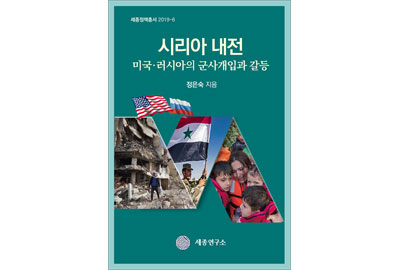The year 2019 is coming to an end. under President Trump’s “America First” slogan, the US is withdrawing from major multilateral international agreements including climate change and Iranian nuclear issues. Though it might be a temporary situation, it makes us think whether the US-led liberal international order will turn into a realist competition among major powers.
This book, <Syrian Civil War: US-Russia Military Intervention and Conflict> mainly focuses on conflict and cooperation between two parties: US with President Trump’s outbound offshore strategy, and Russia with President Putin’s inbound strategy. The book also aims to discuss its implication to the international society. This book is also meaningful in that it tries to analyze changes of the dynamics between our only ally, the US, and our strategic partner close to the Korean Peninsula, Russia.
Since 2014, the US has been leading Allied Forces’ air strikes in order to repel the Islamic State (IS) forces. President Trump recently withdrew the troops as they completed their mission, but things are getting more complicated than one might have guessed. Russia have also participated in air strikes against IS and since then had been a ally of Assad’s rebel purge. As time pass, we must examine whether US overcomes the Vietnam Syndrome, and whether Russia overcomes the Afghanistan Syndrome.
I truly hope that this book is helpful in understanding current international relations surrounding Syria and the Middle East, theory and practice of big power competition, and UN’s peace keeping approach. Also, I hope that this can be a good opportunity for us to remind ourselves that there should be no more armed conflicts in the Korean Peninsula. Even under such circumstances, protecting civilians should become our priority.
This research is part of in-depth research project at The Sejong Institute in 2019. I would like to thank three reviewers for their critical assessment and feedback. Finally, I would also like to thank my assistant, Shin Mi-jung for helping me with data collecting.
Volume No: 2019-6
Issue Date: 2019.11.01.
Page: 147 pages
